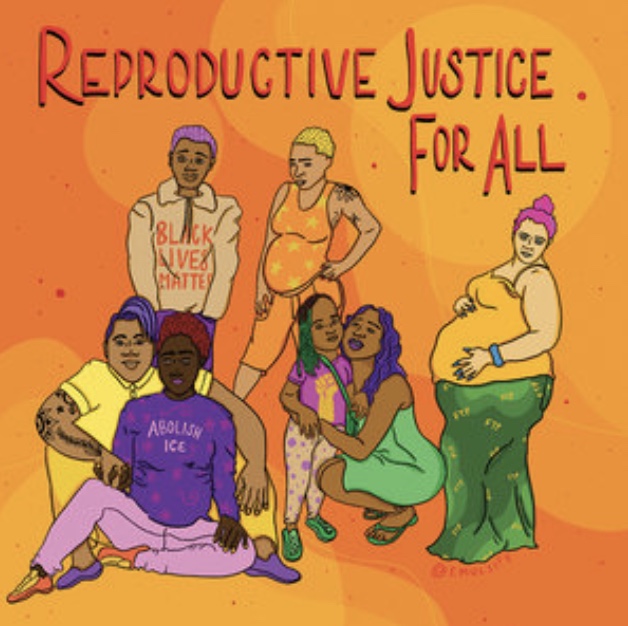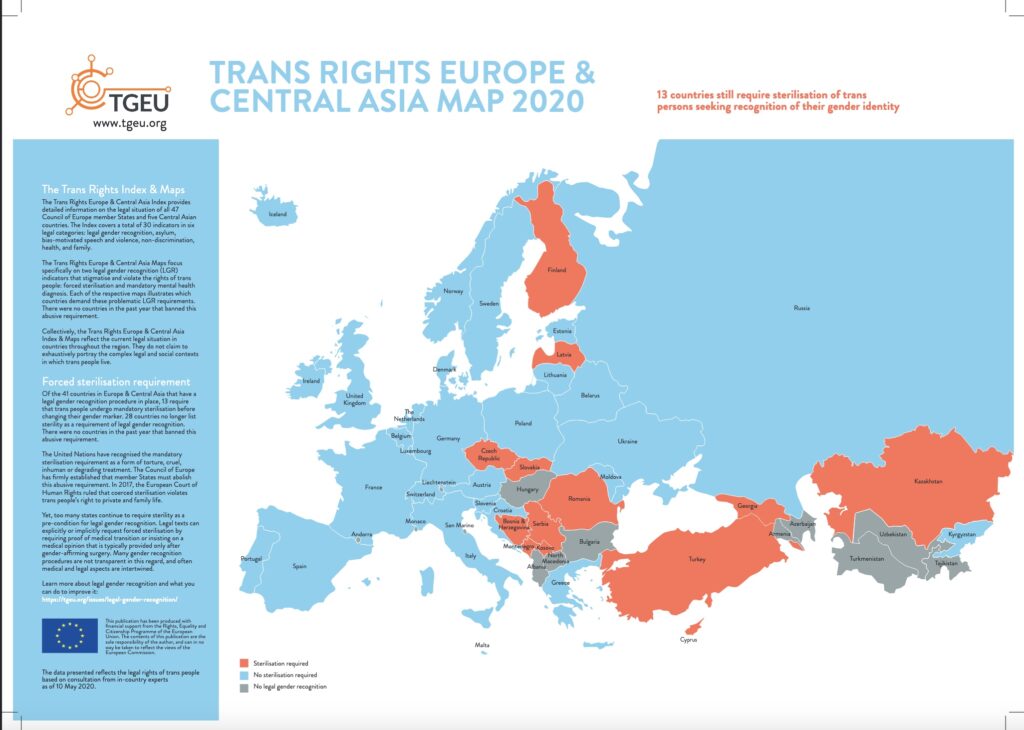Nyko Gessner
This podcast discusses how trans people are prevented access to parenthood through government involvement such as the necessary sterilization to legally transition and discrimination in custody battles against trans people.
Transcript
Reproductive justice, as explained in Radical Reproductive Justice, is “the right to not have children using safe birth control, abortion, or abstinence; the right to have children under the conditions we chose; and the right to parent the children we have in safe and healthy environments.”
None of these rights are afforded to trans people, and specific government legislation is created to prevent trans people from having and parenting children.
Hi, I am Nyko Gessner, and today I am talking about the eugenics that trans people face through government involvement.
A content warning for this episode: I will be talking about eugenics and discrimination trans people face.
Legally transitioning is a process that varies everywhere, usually requires the involvement of personnel in the medical field, is often necessary for preserving the safety of trans people, and can require sterilization of such trans people.
Take the driver’s license, for example. As a common form of identification, it has the potential to out trans people in all kinds of situations, from getting drinks at a bar to boarding airplanes to police interactions.
Being outed can result in violence, so it is imperative for trans people’s safety to have the correct sex marker on legal documents and forms of identification.
Unfortunately, only 8 states have processes that require no medical documentation, those being Arkansas, California, Connecticut, Maryland, Massachusetts, Nevada, Minnesota, and Oregon.
Of the states that do require medical documentation, the language is unclear and open-ended.
In my home state of Alaska, applicants need certification from a (quote)“physician in medicine or osteopathy, social worker, psychologist, professional counselor, physician assistant, or advanced nurse practitioner” to confirm the person “had appropriate clinical treatment for the condition necessitating the change and the change is expected to be permanent.”(unquote)
In more extreme states like Louisiana, a (quote)“successful gender change or reassignment”(unquote) as certified by a physician is necessary for a sex change on a driver’s license.
None of this language explicitly states that sterilization is necessary, but the implication is there.
A “successful gender change or reassignment” is most likely to be interpreted as bottom surgery, which almost always results in sterilization.
Even in Alaska, “appropriate clinical treatment” could mean either bottom surgery or hormone replacement therapy, the latter also leads to decreased fertility.
The ambiguity of most gender change laws in the United States is contrasted by the history of explicit necessary sterilizations in Europe.
In 2015, for 23 countries in Europe, sterilization was necessary for a legal gender change according to Transgender Europe.
Formally, Germany required applicants to be unmarried and “permanently unable to reproduce.”
Thankfully, this law was repealed in 2011 when it was deemed unconstitutional.
Again, being outed, in addition to being mentally taxing, can endanger trans people.
These laws are a form of eugenics.
These laws require trans people to choose between their safety and the possibility to have biological children in the future.
As of April in 2017, the European Court of Human Rights determined, in A.P., Garçon and Nicot v. France, that requiring sterilization violates Article 8 in terms of personal privacy, so all the countries part of the European Union could not require sterilization to legally transition.
The difficulty to just keep the option of being a biologic parent doesn’t end with the intimidation presented by the government to be legally recognized.
There is still the struggle to maintain fertility while transitioning.
As mentioned previously, Bottom surgery almost always results in sterilization and hormone replacement therapy only slightly less so in trans women and with moderately reversible affects in trans men, thus to avoid the passive sterilization of trans people, fertility preservation options need to be aniline.
Blas Radi explains, in Reproductive injustice, trans rights, and eugenics, the importance of access to fertility preservation.
He argues that offering easy to access hormone replacement therapy and gender-affirming surgery without easy to access fertility preservation is a form of eugenics because trans people will not have the same access to reproduction as cis people.
If young trans people are not conscious about their ability to reproduce, then they could be unable to have biological children, even if they might want them.
And Trans people want to use these resources too.
In a 2002 study, out of 121 trans women, 51% said they would have frozen their sperm or at least strongly considered it if it was offered by a provider.
Likewise, in a 2012, 54% of trans men said they wanted children, although it is unclear if the biological relations of the child are of any import.
These numbers are contrasted with the estimated 19% of trans people who are actually parents.
Even if trans people have children, maintaining custody and connection is still a struggle.
Trans people often face discrimination in court cases for custody of their child.
In the 60s, being trans was classified as an illness, and the trans parent was advised to cut all ties with their child as it was thought better for the child to grow up without a parent than with a trans parent.
While being trans is no longer classified as a mental illness, the idea is still pervasive in determining the custody of children of trans people.
The idea of even having a trans parent, is argued as detrimental to the child, believing that it will cause them to be the center of ridicule.
In this country, trans people are targeted to prevent them from having children and raising their children.
The government refuses to protect one of the most vulnerable groups of people and trans people are forced to choose between their bodily autonomy, their safety, their connection to their home, their children, and their identity
Thank you for listening, and also, special shout out to the Earl Grey that kept me caffeinated while writing this.



References
“19% Of Transgender Adults in the US Are Parents.” Williams Institute, October 5, 2020. https://williamsinstitute.law.ucla.edu/press/trans-parents-press-release/.
Blogger, Guest. “A.P., Garçon and Nicot v. France: The Court Draws a Line for Trans Rights.” Strasbourg Observers, May 5, 2017. https://strasbourgobservers.com/2017/05/05/a-p-garcon-and-nicot-v-france-the-court-draws-a-line-for-trans-rights/.
CERTIFICATION FOR CHANGE OF SEX DESIGNATOR ON DRIVER LICENSE OR IDENTIFICATION CARD § (n.d.).
Cheng, Philip J., Alexander W. Pastuszak, Jeremy B. Myers, Isak A. Goodwin, and James M. Hotaling. “Fertility Concerns of the Transgender Patient.” Translational Andrology and Urology 8, no. 3 (June 2019): 209–18. https://doi.org/10.21037/tau.2019.05.09.
Deragon, Sarah. Birthing Dad. Photograph. The Identity Project. San Francisco, 2022. http://www.identityprojectsf.com/new-gallery-1/.
Erazo, M. “Reproductive Justice for All.” Cartoon. Instagram, February 14, 2019. https://www.instagram.com/p/Bt4ot8RhbgJ/?hl=en.
Nixon, Laura. “4. Reproductive Justice and the Right to Parent.” Reproductive Justice 20, no. 1 (December 31, 2013). https://doi.org/10.1525/9780520963207-005.
PHYSICIAN’S STATEMENT FOR GENDER MARKER CHANGE (n.d.).
Radi, Blas. “Reproductive Injustice, Trans Rights, and Eugenics.” Sexual and Reproductive Health Matters 28, no. 1 (October 1, 2020): 1824318. https://doi.org/10.1080/26410397.2020.1824318.
Reese, Trystan. “Trans Women and Fertility: What We Know, What We Don’t Know, and What You Can Do.” Family Equality, May 15, 2020. https://www.familyequality.org/2019/10/02/trans-women-and-fertility-what-we-know-what-dont-know-and-what-you-can-do/.
Rivelli, Elizabeth. “Changing Gender on Your Driver’s License.” Edited by Amy Sims. Bankrate, June 27, 2022. https://www.bankrate.com/insurance/car/changing-gender-on-license/.
“Trans Rights Europe & Central Asia Index 2020.” TGEU, April 14, 2021. https://tgeu.org/trans-rights-europe-central-asia-index-maps-2020/.
[Email Protected]. “Challenges for Transgender Parents in Family Law.” OWJN, November 16, 2022. https://owjn.org/2015/08/01/challenges-for-transgender-parents-in-family-law/.


